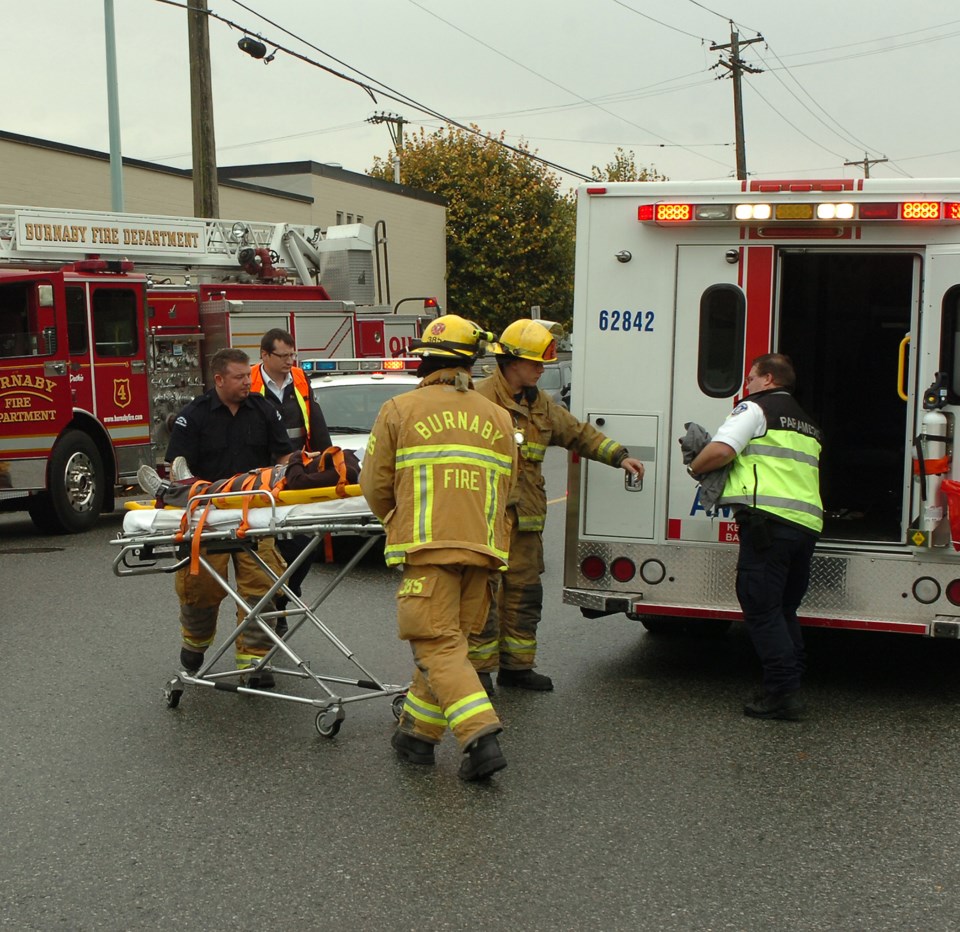A pregnant woman in her first or second trimester who is hemorrhaging or having just miscarried and called 911 is one of the 74 services that has been downgraded from a "hot" to "cold" response by the B.C. Ambulance Service.
The Burnaby Fire Department recently released a report outlining how the changes impacted its work for the first three-and-a-half months, which overall led to longer wait times for ambulances by firefighters.
Last October, the B.C. Ambulance Service changed 74 services from code three to code two in its resource allocation plan. The switch changes the response from lights and sirens to routine calls.
"Firsthand experience of (fire department) personnel has shown that the new (resource allocation plan) has resulted in delayed ambulance response to medical incidents in Burnaby," Doug McDonald, Burnaby's fire chief, said in his report.
For the first three months, firefighters experienced an average nine-minute wait for an ambulance to arrive, the number of incidents where firefighters had to wait more than 30 minutes doubled, and in six incidents they had to wait more than one hour.
"Staff are of the opinion that the changes made on the basis of clinical and statistical data have ignored the important needs of immediate scene assessment and stabilization, as well as patient conditions and status updates at the scene if the event is escalated to more serious than reported or as classified by a call taker," McDonald said. "The delayed ambulance response also requires the (department's) resources to stay at the scene longer and potentially could impact the (department's) ability to respond to other emergencies in a timely manner."
Despite the fire chief's findings, Kelsie Carwithen, spokesperson for the B.C. Emergency Health Services, said since the plan was implemented, paramedics are getting to urgent calls faster and the response time to routine calls is about six minutes longer.
"We found that the six additional minutes for routine calls did not have a negative impact on the patient's condition," she told the NOW.
Carwithen said the changes are not about reducing costs, but using resources "smarter."
"It's important that we make the best use of taxpayer funds while continuing to provide quality care," she said. "It's important that we provide the best patient care we can on each and every call. Resources are being used as effectively as possible and emergency vehicles aren't driving with lights and siren if it isn't required."
In a letter to council, Wynne Powell, board chair of B.C. Emergency Health Services, wrote that most B.C. fire departments decided to match the ambulance service's response.
However, the B.C. Fire Chiefs Association polled its membership regarding matching the ambulance service's plan, and 78 per cent reported they had not changed their level of response for incident types from code three to two.
"In addition, about 48 per cent of the cities polled had experienced increased wait times for an ambulance's arrival," McDonald said.
Councillors expressed their frustrations to the service change's impacts at the council meeting on March 10 as outlined in McDonald's report.
Coun. Paul McDonell said it's another example of the province downloading service to municipalities.
"This is the start of privatizing some of the ambulance service," he added. "This is just the government's way of saying there's more balance in the books and more balance in the budget, and down the torpedoes."
Jordan said the city will not be receiving the report in which the basis of the changes were made it had asked for last fall because "there isn't one."
"Let's face it, this is a mess, and it's a very serious mess," she said. "It's impacted people's lives.
"I'm disgusted by what's being done ... . Those resource decisions are being made in the interests of the bottom line and not in the interests of the citizens, and we're not going to go in that direction."
Mayor Derek Corrigan said Burnaby has chosen not to reduce its responses in line with ambulance service.
Council requested a meeting with Powell to discuss the changes to the ambulance service.
Snapshot of ambulance services downgraded to level two:
- Pregnancy: first and second trimester hemorrhage or miscarriage
- Fainting: female with abdominal pain
- Falls and Trauma injury: serious hemorrhage
- Hemorrhage: possibly dangerous hemorrhage
- Electrocution: unknown status, lightning
- Falls: serious hemorrhage, jumper
- Allergy/sting: unknown status



